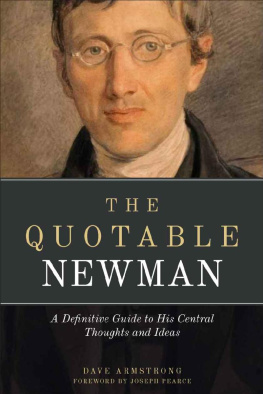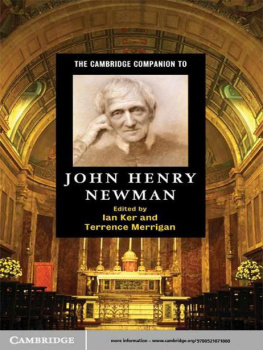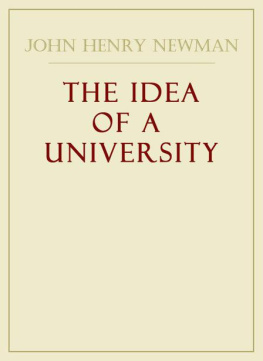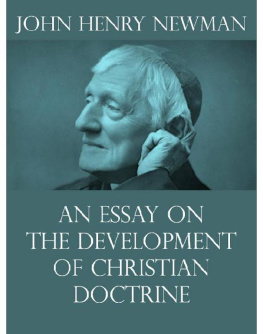
On Consulting the Faithful in Matters of Doctrine
John Henry Newman
[ Rambler , July 1859.]
A QUESTION has arisen among persons of theological knowledge and fair and candid minds, about the wording and the sense of a passage in the Rambler for May. It admits to my own mind of so clear and satisfactory an explanation, that I should think it unnecessary to intrude myself, an anonymous person, between the conductors and readers of this Magazine, except that, as in dogmatic works the replies made to objections often contain the richest matter, so here too, plain remarks on a plain subject may open to the minds of others profitable thoughts, which are more due to their own superior intelligence than to the very words of the writer.
The Rambler , then, has these words at p. 122: in the preparation of a dogmatic definition, the faithful are consulted, as lately in the instance of the Immaculate Conception. Now two questions bearing upon doctrine have been raised on this sentence, putting aside the question of fact as regards the particular instance cited, which must follow the decision on the doctrinal questions: viz. first, whether it can, with doctrinal correctness, be said that an appeal to the faithful is one of the preliminaries of a definition of doctrine; and secondly, granting that the faithful are taken into account, still, whether they can correctly be said to be consulted . I shall remark on both these points, and I shall begin with the second.
1.
Now doubtless, if a divine were expressing himself formally, and in Latin, he would not commonly speak of the laity being consulted among the preliminaries of a dogmatic definition, because the technical, or even scientific, meaning of the word consult is to consult with , or to take counsel . But the English word consult, in its popular and ordinary use, is not so precise and narrow in its meaning; it is doubtless a word expressive of trust and deference, but not of submission. It includes the idea of inquiring into a matter of fact , as well as asking a judgment. Thus we talk of consulting our barometer about the weatherthe barometer only attests the fact of the state of the atmosphere. In like manner, we may consult a watch or a sun-dial about the time of day. A physician consults the pulse of his patient; but not in the same sense in which his patient consults him . It is but an index of the state of his health. Ecclesiastes says, Qui observat ventum, non seminat; we might translate it, he who consults, without meaning that we ask the winds opinion. This being considered, it was, I conceive, quite allowable for a writer, who was not teaching or treating theology, but, as it were, conversing, to say, as in the passage in question, In the preparation of a dogmatic definition, the faithful are consulted. Doubtless their advice, their opinion, their judgment on the question of definition is not asked; but the matter of fact, viz. their belief, is sought for, as a testimony to that apostolical tradition, on which alone any doctrine whatsoever can be defined. In like manner, we may consult the liturgies or the rites of the Church; not that they speak, not that they can take any part whatever in the definition, for they are documents or customs; but they are witnesses to the antiquity or universality of the doctrines which they contain, and about which they are consulted. And, in like manner, I certainly understood the writer in the Rambler to mean (and I think any lay reader might so understand him) that the fidelium sensus and consensus is a branch of evidence which it is natural or it necessary for the Church to regard and consult, before she proceeds to any definition, from its intrinsic cogency; and by consequence, that it ever has been so regarded and consulted. And the writers use of the word opinion in the foregoing sentence, and his omission of it in the sentence in question, seemed to show that, though the two cases put therein were analogous, they were not identical.
Having said as much as this, I go further, and maintain that the word consulted, used as it was used, was in no respect unadvisable, except so far as it distressed any learned and good men, who identified it with the Latin. I might, indeed, even have defended the word as it was used, in the Latin sense of it. Regnier both uses it of the laity and explains it. Cm receptam apud populos traditionem consulunt et sequuntur Episcopi, non illos habent pro magistris et ducibus, &c. (De Eccles. Christi. p. i. 1, c. i., ed. Migne, col. 234.) But in my bountifulness I will give up this use of the word as untheological; still I will maintain that the true theological sense is unknown to all but theologians. Accordingly, the use of it in the Rambler was in no sense dangerous to any lay reader, who, if he knows Latin, still is not called upon, in the structure of his religious ideas, to draw those careful lines and those fine distinctions, which in theology itself are the very means of anticipating and repelling heresy. The laity would not have a truer, or a clearer, or a different view of the doctrine itself, though the sentence had run, in the preparation of a dogmatic decree, regard is had to the sense of the faithful; or, there is an appeal to the general voice of the faithful; or, inquiry is made into the belief of the Christian people; or, the definition is not made without a previous reference to what the faithful will think of it and say to it; or though any other form of words had been used, stronger or weaker, expressive of the same general idea, viz. that the sense of the faithful is not left out of the question by the Holy See among the preliminary acts of defining a doctrine.
Now I shall go on presently to remark on the proposition itself which is conveyed in the words on which I have been commenting; here, however, I will first observe, that such misconceptions as I have been setting right will and must occur, from the nature of the case, whenever we speak on theological subjects in the vernacular; and if we do not use the vernacular, I do not see how the bulk of the Catholic people are to be catechised or taught at all. English has innovated on the Latin sense of its own Latin words; and if we are to speak according to the conditions of the language, and are to make ourselves intelligible to the multitude, we shall necessarily run the risk of startling those who are resolved to act as mere critics and scholastics in the process of popular instruction.
This divergence from a classical or ecclesiastical standard is a great inconvenience, I grant; but we cannot remodel our mother-tongue. Crimen does not properly mean crime ; amiable does not yet convey the idea of amabilis ; compassio is not compassion ; princeps is not a prince ; disputatio is not a dispute ; prvenire is not to prevent . Cicero imperator is not the Emperor Cicero ; scriptor egregius is not an egregious writer ; virgo singularis is not a singular virgin ; retractare dicta is not to retract what he has said ; and, as we know from the sacred passage, traducere is not necessarily to traduce .
Now this is not merely sharp writing, for mistakes do in matter of fact occur not unfrequently from this imperfect correspondence between theological Latin and English; showing that readers of English are bound ever to bear in mind that they are not reading Latin, and that learned divines must ever exercise charity in their interpretations of vernacular religious teaching.
For instance, I know of certain English sermons which were translated into French by some French priests. They, good and friendly men, were surprised to find in these compositions such language as weak evidence and strong evidence, and insufficient, probable, demonstrative evidence; they read that some writers had depreciated the evidences of religion, and that the last century, when love was cold, was an age of evidences. Evidentia , they said, meant that luminousness which attends on demonstration, conviction, certainty; how can it be more or less? how can it be unsatisfactory? how can a sane man disparage it? how can it be connected with religious coldness? The simple explanation of the difficulty was, that the writer was writing for his own people, and that in English an evidence is not evidentia .
Next page
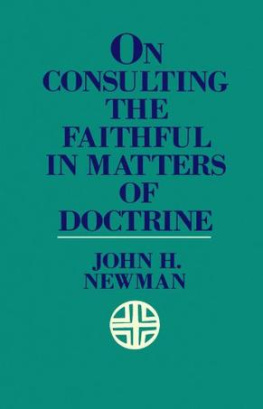
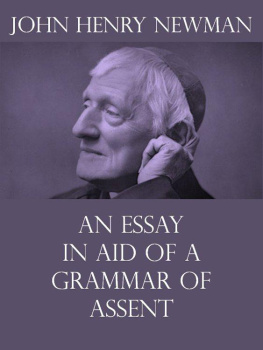
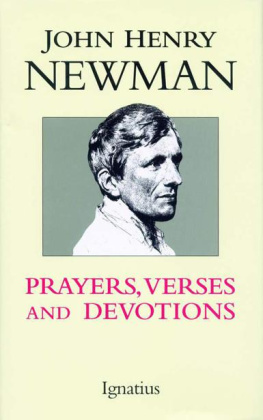
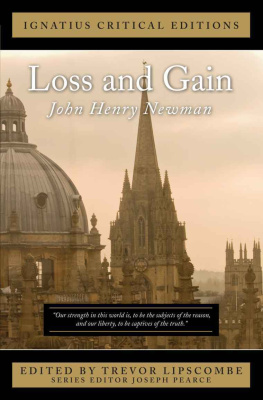
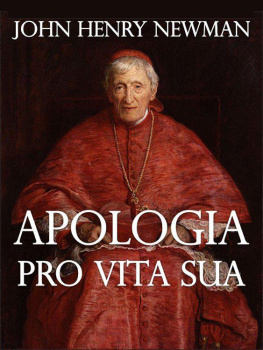
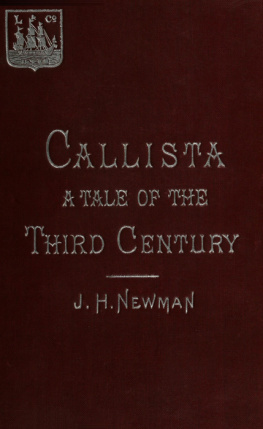
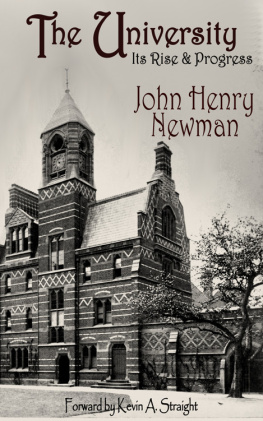

![Blessed John Henry Newman - Blessed John Henry Newman Collection [26 Books]](/uploads/posts/book/371011/thumbs/blessed-john-henry-newman-blessed-john-henry.jpg)
